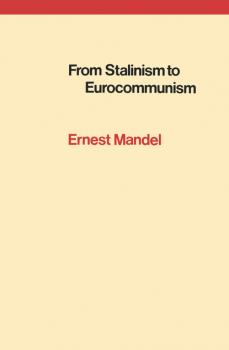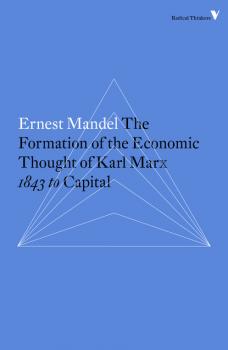ТОП просматриваемых книг сайта:
Ernest Mandel
Список книг автора Ernest MandelАннотация
Der klassische Staatssozialismus, der aus der Oktoberrevolution von 1917 hervorging, scheiterte nicht zuletzt auf ökonomischem Gebiet. Zwar gelang es sozialistischen Staaten in Osteuropa und Asien in der Nachkriegszeit durch die Übernahme des sowjetischen Systems der zentralen Planwirtschaft Schwerindustrien aufzubauen und Wirtschaftswachstum zu erzeugen. Nach anfänglichen Erfolgen bei der nachzuholenden Industrialisierung gerieten diese Länder aber in wirtschaftliche Krisen. Das Modell der zentralen Planwirtschaft konnte weder die wachsenden Konsumbedürfnisse der Bevölkerung befriedigen, noch auf die technologischen Herausforderungen aus dem Westen, wie die «mikroelektronische Revolution», reagieren. Politische Legitimationskrisen der Herrschaft der Kommunistischen Parteien waren die Folge. Nicht wenige Parteikader und ÖkonomInnen des Ostens sahen daher bereits in den 1960er-Jahren marktsozialistische Wirtschaftsreformen als mögliche Lösung der Probleme. Dabei knüpften sie auch an die sowjetische «Neue Ökonomische Politik» (1921–1928) an.
Dieses Buch dokumentiert die zentralen Debatten über die Einbindung kapitalistischer Praktiken in den sozialistischen Alltag. Man diskutierte die Einführung von Marktelementen, die Liberalisierung von Preisen, Dezentralisierung der Planung und die Autonomie für Betriebe. Eine wichtige Rolle spielten die Reformversuche des jugoslawischen Modells unter Tito, das «Neue System der Planung und Lenkung» in der DDR sowie die «sozialistische Marktwirtschaft» der Volksrepublik China.
In der historischen Debatte um «Marktsozialismus» wurden viele Fragen aufgeworfen, die auch im 21.Jahrhundert noch von zentraler Bedeutung sind – nicht zuletzt für zukünftige Experimente einer nichtkapitalistischen Gesellschaft.
Dieses Buch dokumentiert die zentralen Debatten über die Einbindung kapitalistischer Praktiken in den sozialistischen Alltag. Man diskutierte die Einführung von Marktelementen, die Liberalisierung von Preisen, Dezentralisierung der Planung und die Autonomie für Betriebe. Eine wichtige Rolle spielten die Reformversuche des jugoslawischen Modells unter Tito, das «Neue System der Planung und Lenkung» in der DDR sowie die «sozialistische Marktwirtschaft» der Volksrepublik China.
In der historischen Debatte um «Marktsozialismus» wurden viele Fragen aufgeworfen, die auch im 21.Jahrhundert noch von zentraler Bedeutung sind – nicht zuletzt für zukünftige Experimente einer nichtkapitalistischen Gesellschaft.
Аннотация
Leon Trotsky was the most important contributor to the development of revolutionary Marxism this century, after Lenin. As exiled militant or Soviet statesman, party organizer or public orator, as political analyst, soldier or commentator on cultural trends, he was centrally involved in the world-historic upheavals of his time and foremost among the interpreters of their significance for socialism. Yet the fate of his achievement was dramatically discrepant from Lenin's. At the latter's death in 1924, his revolutionary authority was at its zenith. In the Soviet Union his writings were consecrated as repository of a finished dogma, 'Leninism'. Abroad, his thought was interpreted in way much closer to its own original spirit by Georg Lukács, whose remarkable Lenin sought to elicit its unity and actuality for a later revolutionary generation. In polar contrast, factional assault, official disgrace and proscription, anathema and slander, were the conditions of Trotsky's later life and activity—until his assassination in 1940—and the unvarying background of any reaffirmation of his heritage for decades afterwards. Systematic publication of his writings was beyond the means of his political followers—whose internal discussions of his ides were supplemented only by the attentions of liberal (where not reactionary) academics. In the last decade, however, with the resurgence of the political formations associated with his name, Trotsky's political role and ideas have again become topics of vigorous debate among socialists. Ernest Mandel's book makes possible a necessary extension of this debate by providing the first ever synthetic account of the development of Trotsky's Marxism in its successive encounters with the key problems and crises of the epoch. The Russian revolution and the theme of uneven development, the construction of revolutionary parties, the struggle against fascism and imperialism at large, the nature of Stalinism and the prospect of a full socialist democracy, are all discussed in a compact study that makes a fitting and long overdue counterpart to Lukács's historic study of fifty years ago.
Аннотация
Ernest Mandel’s book is a study of Eurocommunism unlike any other. Written in the polemical tradition of Trotsky, its sweep extends well beyond the immediate prospects of the Communist Parties of Western Europe. Mandel traces the long historical process which has transformed the once embattled detachments of the Third International into the constitutionalist formations of “historic compromise” and “union of the people” today. He then goes on to argue that the national roads to socialism of contemporary Eurocommunism are the “bitter fruits of socialism in one country” in the USSR. Mandel’s book contains trenchant and documented criticisms of the ideas of Santiago Carrillo in Spain, the economic policies of the PCI in Italy, and the PCF’s theories of the State in France. But it also sets these Western developments in the context of European politics as a whole—discussing the Russian response to Carrillo, the organizational attitudes of the CPSU to the Western parties, and the emergence of major dissident currents in Eastern Germany sympathetic to Eurocommunism. From Stalinism to Eurocommunism represents the first systematic and comprehensive critique from the Marxist Left of the new strategy of Western Communism. It can be read as a barometer of the storms ahead in the European labour movement.
Аннотация
Ernest Mandel traces the development of Marx’s economic ideas from the Economic and Philosophic Manuscripts of 1844 to the completion of the Grundrisse. In a series of focused chapters he provides an overview of the debates and discussions central to Marxist economic theory.




